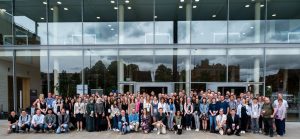Aim:

The Environmental Sensors and Wastewater Surveillance (ESWS) Working Group promotes current state-of-the-art environmental sensors for rapid monitoring to enable point-of-use analysis of pollutants in water, soil, and air at sites of sample collection. Wastewater surveillance (particularly wastewater-based epidemiology, WBE), has emerged as a novel monitoring mechanism for early warning of infectious disease including COVID-19 and is growing as a global technique to monitor public health at the community level.
We aim to gather a multidisciplinary group of researchers with interests in new environmental sensors development, including the underpinning principles, design, materials, methods, devices and applications particularly in wastewater analysis, but also water, air, soil, food, healthcare, biosecurity and beyond. This group provides an opportunity to exchange knowledge and ideas, present early findings, build collaborations and explore interdisciplinary funding opportunities. The working group also aims to enable training for early-career researchers and industry sectors.
Working Group Co-ordinators
 Professor Zhugen Yang, Lecturer in Sensors Technology & NERC Fellow, Cranfield University.
Professor Zhugen Yang, Lecturer in Sensors Technology & NERC Fellow, Cranfield University.
Dr Yang is leading the UKCRIC sponsored Cranfield Sensors Laboratory. His group is developing low-cost and rapid sensors (e.g. paper-based device) for environmental science (e.g. microbial contamination, AMR), public health (e.g. drug of abuse, wastewater surveillance for COVID-19), and biomedical diagnostics (e.g. infectious disease). He is recently involved in the UK national wastewater epidemiology surveillance programme (N-WESP) for COVID-19. Email: zhugen.yang[at]cranfield.ac.uk
Dr Martin Spurr, Research Scientist, Environment Agency. Dr Spurr is part of the Research team in the Chief Scientist’s Group at the Environment Agency. He works on Environment & Health research including a pilot programme for river surveillance of Antimicrobial Resistance (AMR) in the environment. Dr Spurr previously worked at Newcastle University on real-world field trials of water quality biosensors using Bioelectrochemical Systems (BES), helping to setup the joint Newcastle-Northumbrian Water BEWISe research facility. Email: martin.spurr[at]environment-agency.gov.uk.
Interested?
Contact the Working Group co-ordinators. If you’d like to find out more, view our previous webinars directly on YouTube here or see below.
Latest news
See here for recent items on this topic, and for more news click on the ESWS WG tag
The YouTube video playlist for this WG is available here.
For more details on the WG’s activities to March 2025 see WG Report
WG Activities
Webinars – catch up here…
Blended Event: Nanobiotechnology Enabled Sensing of Current and Emerging Pandemic Threats, 21 September 2023. By: Professor Peter J. Vikesland, Virginia Tech, USA. Venue: Stafford Cripps SC2, Cranfield University & MS Teams
Blended Event: ‘Nature Water: A Journal for All Water-related Research’, 19 April 23, 11.00-12.00: By Dr Fabio Pulizzi, Chief Editor, at Cranfield University (Auditorium – Vincent Building (Bldg 52a)) and on Teams.
WBE – what other than Covid-19 have we been monitoring in wastewater?, 10 March 22 by Professor Kevin Thomas, QAEHS.
Fishing for Viruses in Sewage. A tool for understanding the molecular epidemiology of tiny human pathogens, 16 Dec 21 by Dr Javier Martin, National Institute for Biological Standards and Control (NIBSC) . The webinar recording is on YouTube here.
Wastewater Monitoring for Public Health: Research from the Environmental Monitoring for Health Protection (EMHP), 25 Nov 21 by Dr Jazz Grimsley, UK HSA.
Mass Spectrometry in Wastewater-based Epidemiology (WBE) for the Determination of Small and Large Molecules as Biomarkers of Exposure- Needs for COVID-19 Testing with Environmental Proteomics (EP-WBE), 11 Nov 21 by Professor Damia Barcelo – IDAEA-CSIC, Spain. View Professor Barcelo’s presentation here and download the related paper here. The webinar recording is on YouTube here.
Developing the Next-Generation of Monitoring for Human and Environmental Protection, 29 Sep 21 by Dr Andrew Singer, UK CEH, watch on YouTube
EBNet Webinar: Biosensors and Environmental Monitoring – New Developments in Environmental Biotech Chaired by Prof Fred Coulon, Cranfield University. Featuring – Prof Barbara Kasprzyk-Hordern, University of Bath and Dr Zhugen Yang, Lecturer in Sensors Technology & NERC Fellow, Cranfield University.
The YouTube playlist for this working group is here.
Events
2nd International Symposium on Microfluidics for Single Cell Sensing and Sequencing (ISM3S): Environment and Health, 29-30 July 2025 in Oxford, UK
For a report on this very successful event see here.

Previous events supported by EBNet
Testing the Water 6 (TTW6): An International Conference on Wastewater Surveillance. 26-27 June 2023, Oxford University, Said Business School.
Theme – Advances in wastewater-based epidemiology including: Recent developments in the measurement of new markers of population health, exposure and activity in wastewater; Linking wastewater analysis with public health management; Large-scale monitoring programs of drug, disease and/or exposure control authorities, evaluation of policies using wastewater monitoring data, cultural and legal aspects of drug monitoring; New applications and future perspectives; Bridging WBE and other data sources, early warning of new substances via wastewater analysis.

Advanced Sensors Technology. This Cranfield University masterclass covers the fundamental principles of sensors technology (transducers, recognition element, signal application strategy etc), and showcases their application to water quality monitoring as well as cutting-edge wastewater-based epidemiology. It combines lecture-like sessions with engaging activities, video case studies and group discussions. 5 May 2023.
EBNet supported ECRs to travel to UCL for a GUEST LECTURE on the Fate, Risks and Remediation of Emerging Contaminants, Antibiotic Resistance Genes and Microplastics in Surface Waters and Groundwaters of Selected European Rivers and Future Covid-19 Related Challenges. Speaker: Prof Damià Barceló Cullerès, UCL, London. 7 December 2022.
The Cranfield Water masterclass series: Advanced Sensors Technology for the Water-Environment-Health Nexus, 27 May 2022
3rd Party Events
Mini symposium on microfluidics for single cell sensing and sequencing – 23 July 2024, Cranfield University. For details see here.
Keynote speakers with world-leading multidisciplinary expertise were invited to talk about recent research progress on microfluidics for sensing single microbes in environmental samples. This newly developed technology could be potentially applied for wastewater surveillance and provide insight into the mechanism of antibiotic resistance genes transmission among microbial communities, such as horizontal gene transfer and host-phage infection. It is also applicable to other environmental samples, such as soil and ocean for environmental studies under one health perspective. We were especially trying to encourage our early career researchers and young students to engage with world-leading scientists. Everyone interested in this research area was welcome to attend the symposium for knowledge exchange, developing research ideas, and future collaborations.
Speakers: Prof David Weitz, Harvard University, USA; Prof Shrike Yu Zhang, Harvard Medical School, USA; Prof Baojun Wang, Zhejiang University, China; Dr Firat Guter, Imperial College London, UK; Prof Anderson Shum, Hong Kong University, China; Prof Jianhua Guo, University of Queensland, Australia; Prof Li Cui, Institute of Urban Environment-CAS, China.
Outreach
- Track and Trace Tests Start to Fingerprint Environmental Pollution, an article in the EBNet Corner of the ADBA Magazine, Issue 52, Winter 2021, extracted here.
- TrAC Journal – Special Issue Opportunity. WG co-ordinator Zhugen Yang hosted a special issue in Trends in Analytical Chemistry (TrAC) (IF 9.8, Elsevier) on the topic of biosensors and wastewater surveillance. See here for details.
EBNet POC Funding
EBNet funded the following Proof-of-Concept (POC) projects in this area:
CRISPR/Cas-enabled paper-based sensors for rapid monitoring of antimicrobial resistance EBNet POC202214 Prof Zhugen Yan, Cranfield University
Fluorescent microbiofilter assay for rapid real-time monitoring of organic micropollutants biodegradation EBNet POC202113 Dr Caroline Gauchette-Lindsay, University of Glasgow
Faecal Pollution Source Tracking & Quantitative Microbial Risk Assessment methods for a Suitcase Laboratory EBNet POC202101 Prof David Werner, Newcastle University
WG Journal papers
CRISPR-enabled sensors for rapid monitoring of environmental contaminants. Wang, Y., Pan, Y., Han, W., Rossi, C.S., Hui, Q., Guo, Y., Owoseni, M.C., McAdam, E., Yong, Y.C., Wang, B. and Yang, Z., 2024. TrAC Trends in Analytical Chemistry, p.118128.
Targeted Enrichment of Nucleic Acid Bionic Arms Enhances the Hydrolysis Activity of Nanozymes for Degradation and Real-Time Monitoring of Organophosphorus Pesticides in Water. Zhou, J., Xiong, D., Zhang, H., Xiao, J., Huang, R., Qiao, Z., Yang, Z. and Zhang, Z., 2025. Environmental Science & Technology.
Environmental DNA clarifies impacts of combined sewer overflows on the bacteriology of an urban river and resulting risks to public health. Zan, R., Blackburn, A., Plaimart, J., Acharya, K., Walsh, C., Stirling, R., Kilsby, C.G. and Werner, D., 2023. Science of the Total Environment, 889, p.164282.
BODIPY-labeled estrogens for fluorescence analysis of environmental microbial degradation. Felion, C., Lopez-Gonzalez, R., Sewell, A.L., Marquez, R. and Gauchotte-Lindsay, C., 2022. ACS omega, 7(45), pp.41284-41295.
Review of paper-based microfluidic analytical devices for in-field testing of pathogens. Li W, Ma X, Yong YC, Liu G & Yang Z (2023). In: Analytica Chimica Acta, 1278 (October) Article No. 341614.


